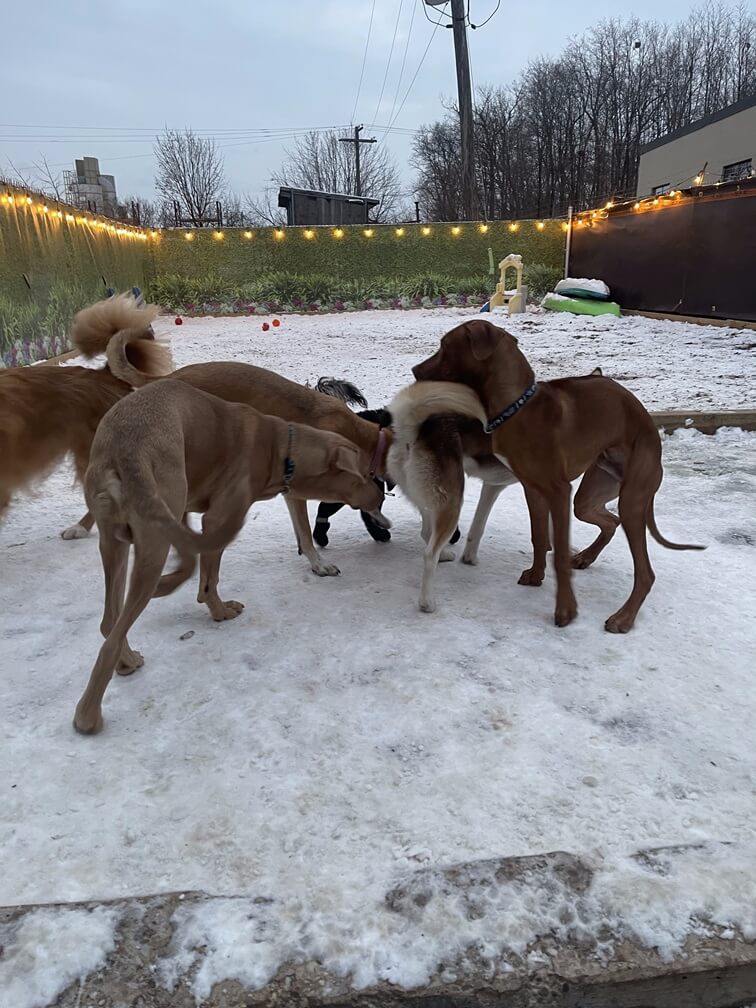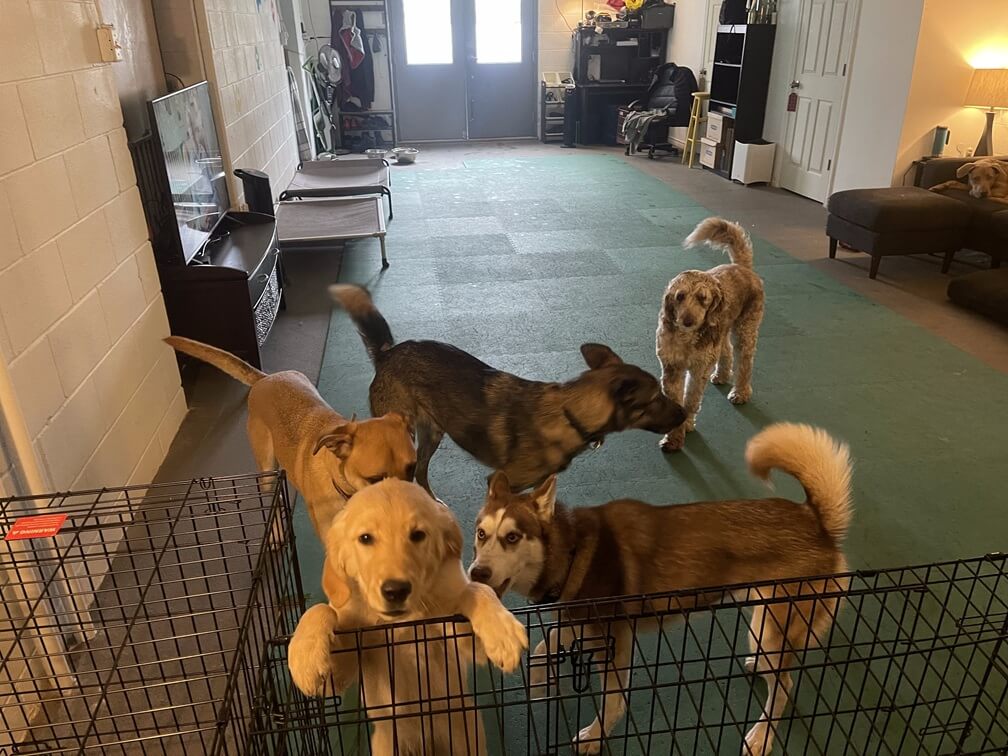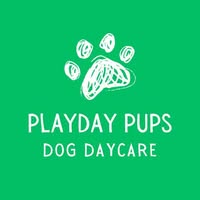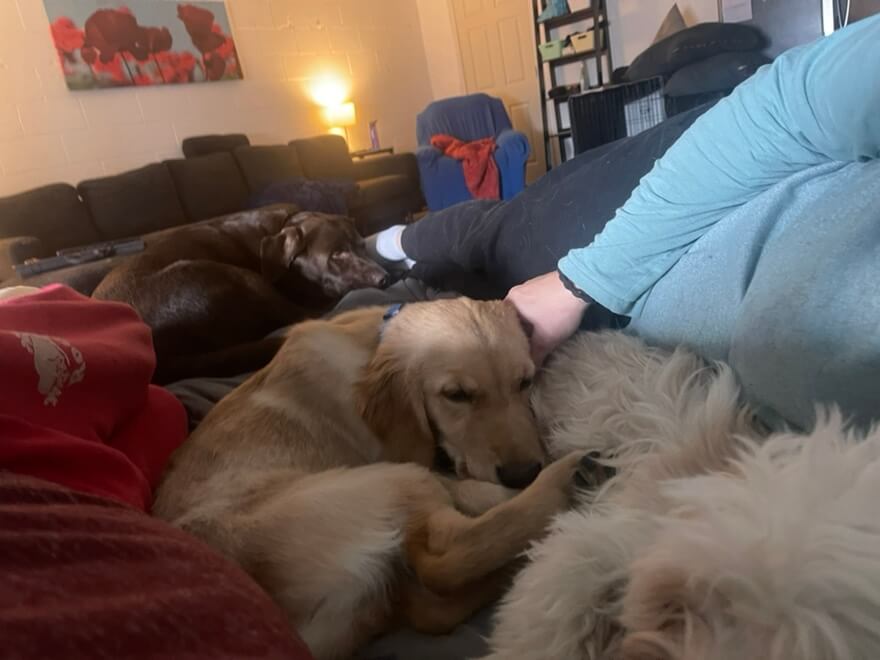Understanding Dog Socialization
Dog socialization is the process of teaching your dog how to interact calmly and appropriately with other dogs, people, and environments. It’s a skill that helps dogs feel secure in social settings—whether it’s the dog park, a vet visit, or simply greeting another pup on a walk.
Proper socialization should start in puppyhood but continues throughout life. Dogs are social animals by nature, and they need ongoing opportunities to practice communication, play, and self-regulation in safe settings.
Daycare, especially at a place like Playday Pups, offers the perfect space for these experiences to happen under professional supervision.

Common Signs of Poor Socialization
Fear or Aggression Toward Other Dogs
Dogs that haven’t had regular exposure to other dogs may react defensively—growling, barking, or lunging. This isn’t bad behavior; it’s fear. Controlled socialization helps ease those fears.
Anxiety in New Environments
If your dog gets stressed or shuts down in unfamiliar places, it may lack confidence due to limited social experiences. Repeated exposure in a safe setting helps build resilience.
Overexcitement or Hyperactivity
Jumping on every dog, barking excessively, or becoming unmanageable on leash can indicate poor self-control. Daycare teaches dogs how to manage excitement through structure and play.
Why Daycare is the Best Environment for Socialization
Supervised Playgroups
At Playday Pups, trained staff monitor all dog interactions to ensure safe, respectful play. Dogs are grouped by size, temperament, and energy levels to foster positive experiences.
Exposure to Different Dogs and Personalities
Every dog is different—and that’s the point. Exposure to a variety of play styles, breeds, and temperaments teaches your dog how to adapt, communicate, and coexist.
Repetition and Routine for Lasting Change
One-off visits don’t make a lasting impact. Ongoing attendance builds muscle memory and positive associations that stick. Routine builds confidence.

Key Benefits of Socialization Through Daycare
Improved Behavior at Home and in Public
Dogs who attend daycare often exhibit fewer behavioral issues—less leash reactivity, better listening skills, and more calm behavior around guests or in public.
Increased Confidence in Shy or Anxious Dogs
Socially unsure dogs benefit tremendously from daycare. Structured interactions and gentle encouragement help them blossom into balanced, outgoing companions.
Reduction in Destructive or Anxious Behaviors
Socialization offers mental stimulation and emotional outlet. Dogs with fulfilled social needs are less likely to chew, bark excessively, or develop separation anxiety.
Enhanced Communication Skills with Other Dogs
Dogs speak through body language. At daycare, they learn how to “read the room,” adjust play behavior, and communicate boundaries effectively.
Physical and Mental Enrichment
Socialization is exercise for both the body and the mind. Structured play, scent games, and social interactions tire dogs out in the best way possible.
Socialization for Puppies vs. Adult Dogs
Socialization looks different depending on age:
- Puppies: Learn play cues, bite inhibition, and confidence. It’s the most critical window for forming positive habits.
- Adults: May need slower introductions or special pairings. With patience and guidance, even older dogs can learn new social skills.
At Playday Pups, we tailor playgroup assignments to each dog’s stage and style.
How Playday Pups Supports Healthy Socialization
At Playday Pups, we believe socialization isn’t just an activity—it’s a mission. Our approach includes:
- Structured Playgroups based on compatibility
- Experienced Staff trained in behavior and body language
- Custom Intro Protocols for new or shy dogs
- Behavioral Feedback to keep you informed
Every visit builds confidence, connection, and calm.

FAQs About Dog Socialization at Daycare
Q1: Can daycare help my aggressive dog?
If your dog has a history of aggression, we’ll assess them individually. Many dogs improve dramatically with proper group exposure.
Q2: My dog is shy—will daycare be too overwhelming?
Not at all. We introduce shy dogs slowly and match them with gentle companions to build trust.
Q3: How often should my dog attend to see social benefits?
2–3 times per week is ideal for long-term improvement, but even once a week helps.
Q4: Do dogs fight at daycare?
Conflicts are rare at Playday Pups because we proactively manage group dynamics and intervene early.
Q5: What’s the difference between a dog park and daycare?
Dog parks are unsupervised. Daycare offers structured, safe play monitored by professionals.
Q6: Is socialization only for young dogs?
Nope! Dogs of any age can benefit, and it’s never too late to start.
The benefits of dog socialization at daycare are far-reaching: better behavior, stronger confidence, reduced anxiety, and happier dogs. Whether your pup is playful, shy, or somewhere in between, structured social time is one of the greatest gifts you can offer.
At Playday Pups, we make that gift safe, fun, and enriching—every single day.
🐾 Ready to let your dog thrive? Schedule a tour or trial visit today and see the difference socialization can make.

Playday Pups is a boutique dog daycare and home-like boarding service located in Burlington, Ontario. Owned and operated by Tara and Dave, we specialize in creating a fun, safe, and structured environment where dogs can play, relax, and thrive. Whether you’re looking for dog daycare during the workweek or dog boarding for overnight stays, we provide personalized care for every pup. Ready to join the pack? Start by filling out our dog registration form.
☎️ (905) 230-2541 | 📨 hello@playdaypups.ca | 🚗 1234 Advance Rd, Burlington Google MAP



